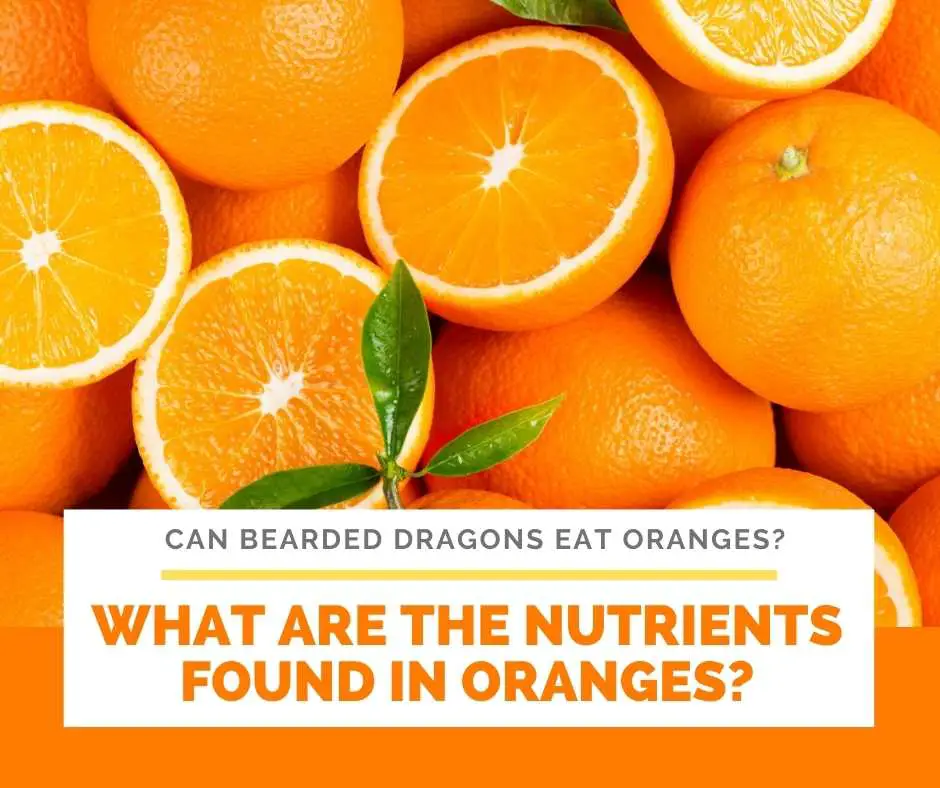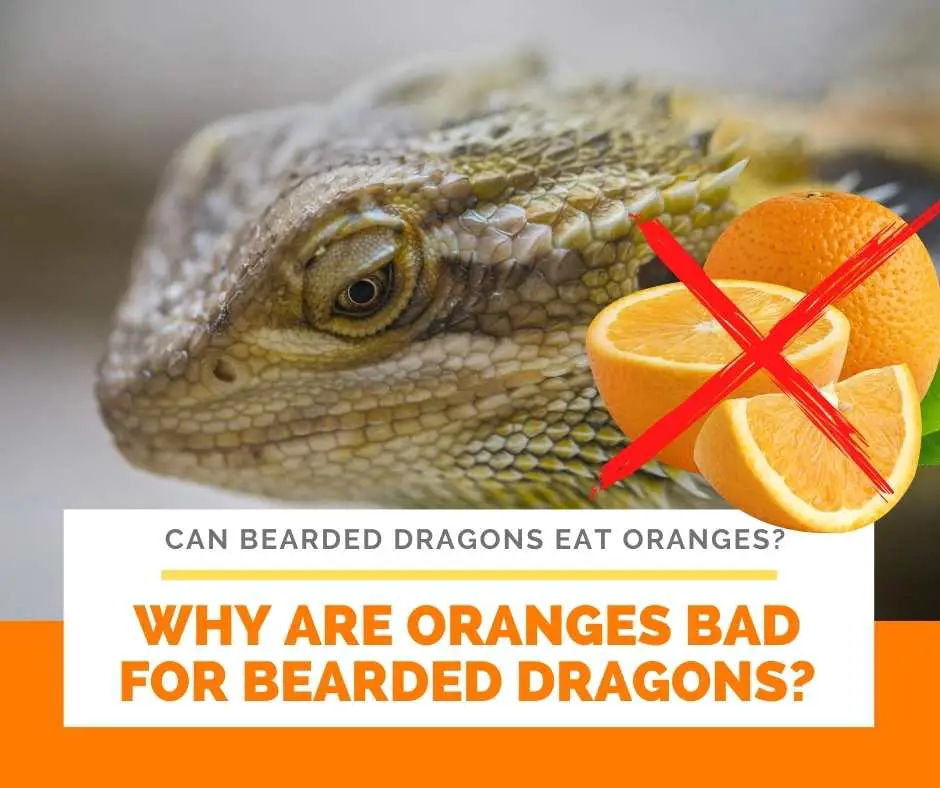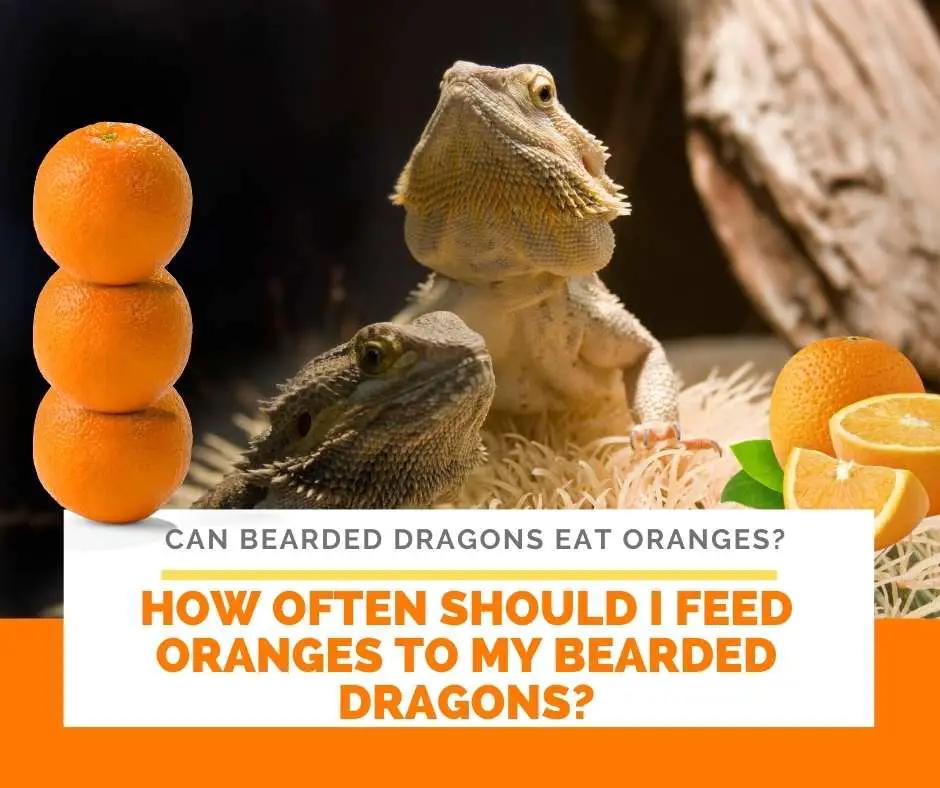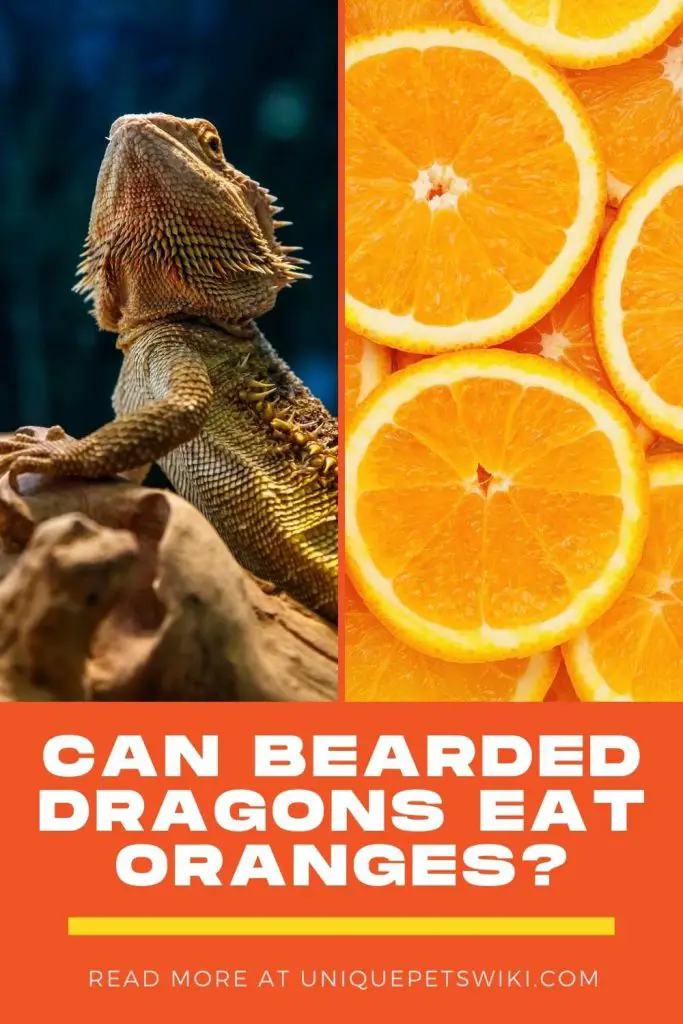Perhaps you may be wondering what fruits are safe for the beardies and whether can bearded dragons eat oranges? You will get the answer right here in this article.
Bearded dragons are omnivores, and they need a diet that is balanced in veggies, greens, fruits, and insects. There are many fruits which you can feed to your beardie, but of course, some fruits are ideal than the others.
So, where are oranges classified, are they suitable fruits to include in the dragon’s diet or not? Here, we will see whether it is okay to feed the beardies with oranges, its impact on your pet’s health, and more.
Contents
- What are the Nutrients Found in Oranges?
- Can Bearded Dragons Eat Oranges?
- Why are Oranges Bad for Bearded Dragons?
- How Often Should I Feed Oranges to My Bearded Dragons?
- Can Bearded Dragons Eat Orange Peels?
- Can I Give Orange Juice to My Bearded Dragon?
- What Fruits Can I Feed My Bearded Dragons Instead of Oranges?
- Conclusion
What are the Nutrients Found in Oranges?

Oranges are the most popular juicier fruits among the citrus fruits, and they are widespread in many parts of the world.
Many things make oranges outstanding and famous citrus fruits, including versatility, natural sweetness and the many varieties of oranges available. Oranges are incredibly nutritious, and they are renowned for their vitamin C content.
It is good to eat an orange, but it is more important to understand its nutritional value. This helps you to know the size of oranges to eat and how often to take it. Taking excess of oranges will not help you, and they can be toxic.
The acid level in oranges, sugar, fiber, protein, fat, water, calcium and phosphorus content is of significant interest as far as bearded dragons are concerned.
Take a look at the list below that shows the data for nutritional facts of oranges per 100 grams. The data is sourced from the United States Department of Agriculture (USDA).
- Water: 87%
- Energy: 47 kcal
- Total carbs: 12g
- Sugar: 9g
- Dietary fiber: 2.4g
- Protein: 0.9g
- Total fat: 0.1g
- Vitamin A: 11µg
- Vitamin B6: 0.05mg
- Vitamin C: 45mg
- Vitamin E: 0.18mg
- Phosphorus: 12mg
- Calcium: 43mg
- Iron: 0.09mg
- Potassium: 181mg.
Can Bearded Dragons Eat Oranges?

Some posts discourage feeding oranges to bearded dragons, ultimately while others state that beardies can eat oranges as occasional fruits. This can be a little bit confusing, especially if you have no idea about the good side nor the downside of oranges.
It requires you to weigh between the bottom lines and limitations of using oranges as fruits for bearded dragons. Sincerely, oranges can either be bad or good for the beardies depending on the amount that is offered.
So, the answer is quite simple: bearded dragons can eat oranges, but you need to make sure that you feed them the correct amount. Ideally, you can feed your beardies oranges once or twice a month, one or two small slices of oranges are enough.
You can include oranges in your bearded dragon’s diet, but not more often. If your lizard likes eating oranges, don’t deny it to have some, be sure to include a few pieces of oranges in the meal but only as a treat.
Too much of oranges is not really good for the beardies because these fruits contain high acid levels and extremely high sugar which can lead to severe diarrhea, dehydration and other health problems.
So, oranges can be offered to bearded dragons as a rare treat, and this will help to avoid the health issues associated with them.
While mandarin oranges have high calcium to phosphorus ratio, all other types of oranges contain more phosphorus than calcium. If you decide to feed oranges to your dragon, mandarin oranges would be the best option because they are relatively high in calcium.
But the truth is that all fruits are typically low in calcium and cannot meet the level demanded by the bearded dragons, hence, there is a need for supplementation.
Why are Oranges Bad for Bearded Dragons?

Although oranges are safe when fed as a rare treat, there are many downsides about them, and they can be harmful to the beardies. Let’s take a closer look at why oranges can be dangerous to bearded dragons.
High Sugar Content
Excess sugar in the bearded dragon’s diet is dangerous and can result in many health problems. For instance, a high sugar diet can cause overweight—excess sugar results in excess fat, which in the end, introduces other severe health problems.
Fruits should make up only 10% of the bearded dragon’s diet, while 90% consists of insects, veggies and greens.
Something that you may be unaware of is that foods that are acidic and with high sugar content can cause tooth problems, and this is true in the bearded dragon. The beardie’s teeth are directly fixed to the jaw.
The high acid and sugar content in foods forms tartar and plaque around the jaw, and this can result in inflammation or bone infection.
Moreover, acidic and sugary fruits can cause stomach upset. A bearded dragon that has a stomach upset will not eat, and some beardies end up having diarrhea. Of course, severe diarrhea will make the dragon dehydrated, and you end up with a sick pet.
Low Calcium to Phosphorus Level
Most varieties of oranges have more phosphorus than calcium aside from mandarin oranges.
Bearded dragons require a calcium to phosphorus ratio of 1.5:1 or 2:1, and at this range, there is effective absorption of calcium. On the other hand, too much phosphorus in the diet interferes with the absorption of calcium.
The body requires sufficient calcium to keep the muscles, organs and bones healthy. If your bearded dragon does not get adequate calcium, it may end up suffering from metabolic bone disease.
Aside from getting calcium from the diet, bearded dragons need to be supplemented with calcium. This ensures that the beardies are getting enough calcium they require per day.
How Often Should I Feed Oranges to My Bearded Dragons?

By now, you know that fruits should not be a staple food to bearded dragons, but instead, they need to be fed occasionally. Fruits are incredibly sugary and do not offer enough nutrients to bearded dragons, so they should not be part of staple food.
Bearded dragons have a small stomach and get full quite quickly. So, if you give them foods that are poor in nutrition, the stomach becomes filled with foods that do not benefit it. Offering the same kind of food over and over can cause health problems.
However, I don’t mean that fruits aren’t nutritious; in fact, they also play some part in adding some nutrients in the diet.
Fruits like oranges can be a superb option to entice bearded dragons to eat from the salad bowl if the beardie is refusing the nutritious greens and veggies you provide in the bowl.
The best way to feed oranges to bearded dragons is once or twice a month and provide them as part of the diet. Give about 1-2 small pieces of oranges that are sliced; this is a significant amount and cannot cause any health problems.
Can Bearded Dragons Eat Orange Peels?
You might be wondering whether it is safe for bearded dragons to eat orange peels. But the truth is orange peels are exceedingly acidic and can be harmful to the beardies.
Likewise, orange peels have oxalic acid, and dietary calcium combines with this acid to form calcium oxalate. Then calcium becomes unavailable, and because the body is not getting enough calcium, it will have to extract this mineral from the bones.
Removal of calcium from the bones makes them weak and eventually leads to metabolic bone disease. So, never feed your bearded dragon with orange peels at any time.
Can I Give Orange Juice to My Bearded Dragon?
Orange juice has the same content of sugar and acid as the fruit itself. It has the same effects the fruit has on bearded dragons. Feeding this juice to bearded dragons can cause diarrhea and dehydration.
One thing you always need to remember is that bearded dragons know how to drink water only, the same way they would live in the desert. They are not accustomed to drinking a lot in their natural habitat.
So, it is not easy to train a bearded dragon to start drinking something different from water. But in case your lizard can take other drinks apart from water, you should never give it orange juice.
What Fruits Can I Feed My Bearded Dragons Instead of Oranges?
After seeing that oranges are pretty acidic and have too much sugar, it is clear that they are not superb option fruits to feed bearded dragons. So, what other fruits can be used instead of oranges?
If you can remember, I said earlier that no fruit is highly nutritious, they are all low in minerals just like oranges. And that is the main reason why fruits should make up the smallest percentage in the beardie’s diet.
Several fruits can be the best option for bearded dragons, but it doesn’t mean that they are good, and oranges are bad. However, they are less acidic than oranges, but they are also sugary.
With that being said, some fruits which you can use instead of oranges are; apricots, strawberries, dates, and raspberries. They should as well be given as a treat like oranges.
Conclusion

Yes, bearded dragons can eat oranges; in fact, some beardies like them a lot, but they should not be allowed to eat many oranges.
You can choose to offer these fruits to your dragon as a rare treat, or you avoid them. As we have seen, oranges are highly acidic and have a lot of sugar, which can harm your bearded dragon.
Generally, fruits have low minerals, and much of minerals and vitamins come from the veggies and greens. So, you should pay more attention to staple foods like collard greens and other vegetables suitable for bearded dragons.
